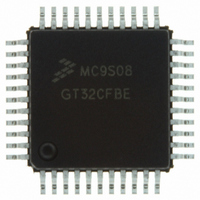MC9S08GT32CFDE Freescale Semiconductor, MC9S08GT32CFDE Datasheet - Page 90

MC9S08GT32CFDE
Manufacturer Part Number
MC9S08GT32CFDE
Description
IC MCU 32K FLASH 20MHZ 48-QFN
Manufacturer
Freescale Semiconductor
Series
HCS08r
Specifications of MC9S08GT32CFDE
Core Processor
HCS08
Core Size
8-Bit
Speed
40MHz
Connectivity
I²C, SCI, SPI
Peripherals
LVD, POR, PWM, WDT
Number Of I /o
39
Program Memory Size
32KB (32K x 8)
Program Memory Type
FLASH
Ram Size
2K x 8
Voltage - Supply (vcc/vdd)
1.8 V ~ 3.6 V
Data Converters
A/D 8x10b
Oscillator Type
Internal
Operating Temperature
-40°C ~ 85°C
Package / Case
48-QFN
Controller Family/series
HCS08
No. Of I/o's
39
Ram Memory Size
2KB
Cpu Speed
40MHz
No. Of Timers
2
Rohs Compliant
Yes
For Use With
M68DEMO908GB60E - BOARD DEMO MC9S08GB60M68EVB908GB60E - BOARD EVAL FOR MC9S08GB60
Lead Free Status / RoHS Status
Lead free / RoHS Compliant
Eeprom Size
-
- Current page: 90 of 290
- Download datasheet (2Mb)
Chapter 6 Parallel Input/Output
PTDDn — Port D Data Register Bit n (n = 0–7)
PTDPEn — Pullup Enable for Port D Bit n (n = 0–7)
PTDSEn — Slew Rate Control Enable for Port D Bit n (n = 0–7)
PTDDDn — Data Direction for Port D Bit n (n = 0–7)
6.6.5
Port E includes eight general-purpose I/O pins that share with the SCI1 and SPI modules. Port E pins used
as general-purpose I/O pins are controlled by the port E data (PTED), data direction (PTEDD), pullup
enable (PTEPE), and slew rate control (PTESE) registers.
If the SCI1 takes control of a port E pin, the corresponding PTEDD bit is ignored. PTESE can be used to
provide slew rate on the SCI1 transmit pin, TxD1. PTEPE can be used, provided the corresponding
PTEDD bit is 0, to provide a pullup device on the SCI1 receive pin, RxD1.
If the SPI takes control of a port E pin, the corresponding PTEDD bit is ignored. PTESE can be used to
provide slew rate on the SPI serial output pin (MOSI1 or MISO1) and serial clock pin (SPSCK1)
depending on the SPI operational mode. PTEPE can be used, provided the corresponding PTEDD bit is 0,
to provide a pullup device on the SPI serial input pins (MOSI1 or MISO1) and slave select pin (SS1)
depending on the SPI operational mode.
Reads of PTED will return the logic value of the corresponding pin, provided PTEDD is 0.
90
For port D pins that are inputs, reads return the logic level on the pin. For port D pins that are
configured as outputs, reads return the last value written to this register.
Writes are latched into all bits of this register. For port D pins that are configured as outputs, the logic
level is driven out the corresponding MCU pin.
Reset forces PTDD to all 0s, but these 0s are not driven out the corresponding pins because reset also
configures all port pins as high-impedance inputs with pullups disabled.
For port D pins that are inputs, these read/write control bits determine whether internal pullup devices
are enabled. For port D pins that are configured as outputs, these bits are ignored and the internal pullup
devices are disabled.
For port D pins that are outputs, these read/write control bits determine whether the slew rate
controlled outputs are enabled. For port D pins that are configured as inputs, these bits are ignored.
These read/write bits control the direction of port D pins and what is read for PTDD reads.
1 = Internal pullup device enabled.
0 = Internal pullup device disabled.
1 = Slew rate control enabled.
0 = Slew rate control disabled.
1 = Output driver enabled for port D bit n and PTDD reads return the contents of PTDDn.
0 = Input (output driver disabled) and reads return the pin value.
Port E Registers (PTED, PTEPE, PTESE, and PTEDD)
MC9S08GB/GT Data Sheet, Rev. 2.3
Freescale Semiconductor
Related parts for MC9S08GT32CFDE
Image
Part Number
Description
Manufacturer
Datasheet
Request
R
Part Number:
Description:
Manufacturer:
Freescale Semiconductor, Inc
Datasheet:
Part Number:
Description:
Manufacturer:
Freescale Semiconductor, Inc
Datasheet:
Part Number:
Description:
Manufacturer:
Freescale Semiconductor, Inc
Datasheet:
Part Number:
Description:
Manufacturer:
Freescale Semiconductor, Inc
Datasheet:
Part Number:
Description:
Manufacturer:
Freescale Semiconductor, Inc
Datasheet:
Part Number:
Description:
Manufacturer:
Freescale Semiconductor, Inc
Datasheet:
Part Number:
Description:
Manufacturer:
Freescale Semiconductor, Inc
Datasheet:
Part Number:
Description:
Manufacturer:
Freescale Semiconductor, Inc
Datasheet:
Part Number:
Description:
Manufacturer:
Freescale Semiconductor, Inc
Datasheet:
Part Number:
Description:
Manufacturer:
Freescale Semiconductor, Inc
Datasheet:
Part Number:
Description:
Manufacturer:
Freescale Semiconductor, Inc
Datasheet:
Part Number:
Description:
Manufacturer:
Freescale Semiconductor, Inc
Datasheet:
Part Number:
Description:
Manufacturer:
Freescale Semiconductor, Inc
Datasheet:
Part Number:
Description:
Manufacturer:
Freescale Semiconductor, Inc
Datasheet:
Part Number:
Description:
Manufacturer:
Freescale Semiconductor, Inc
Datasheet:










